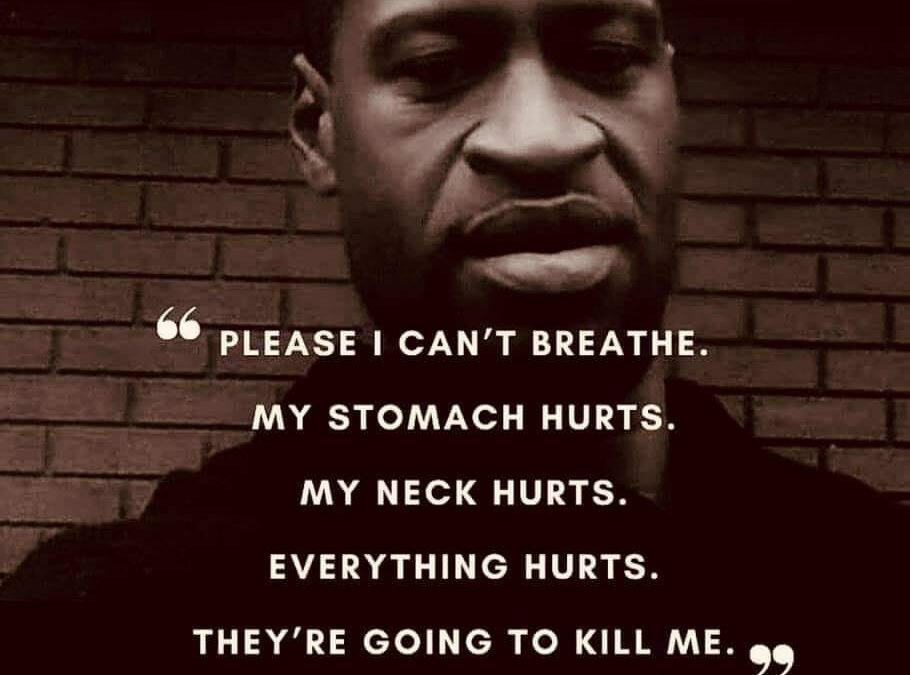
by Carol Stewart | May 25, 2021 | Blog, Latest News
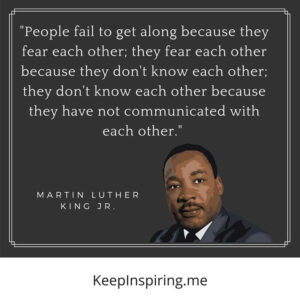
On the 25th May 2020, the whole world witnessed an act of racially motivated brutality that resulted in the death of George Floyd.
Derek Chauvin, was seen kneeling on the neck of a man that was handcuffed, unable to move , unable to breathe for 9 minutes.
The aftermath that followed sent shock waves all over the world. We saw #Blacklivesmatter matter trending all over social media, organisations posting #BLM statements to show solidarity, we saw protests, endless debates, and an increase in diversity training.
There was a sense of shock and disbelief that a police officer, who is meant to protect and serve, could do such a thing.
The outrage that followed, was not just about what happened on that fateful day, it was anger and outrage about all the other people that have been murdered by police not just in the states but in other parts of the world, Sandra Bland, Trayvon Martin, Clinton Mcurbin, for whom nobody has been held to account. It was a call for action, a call for justice.For decades a number of individuals and families have been campaigning for more thorough investigations into deaths in custody. One such organisation is The United Families & Friends Campaign (UFFC). They were established in 1997 by families who had loved ones die in police custody.
Figures in 2020 showed that over a period of 10 years, there were 164 people who had died in police custody in England and Wales. ( BBC.co.uk June 3 2020).
Over the past year, many organisations have been reflecting on how to respond, but in a way that is meaningful. They have used it as an opportunity to reflect on the diversity of their workforce, the services they deliver, and if they meet the needs of a diverse population, treatment of Black and minority staff with regards to career prospects.
So what has changed?
I have seen some changes, although the lasting impact is yet to be measured. I have seen an increase in diversity training, reviews now taking place on the race equality framework for local government, a government commissioned report into race and ethnic disparities, which has received widespread criticism.
I have seen schools examine diversity in the curriculum, more diverse representation in the media, especially in TV advertising and mainstream media.
Whilst this all sounds really positive, worryingly we are still seeing and hearing of racist incidents in sports, in the media, disproportionality in stop and search, and a lack of diversity at senior levels in organisations.
A report published in February 2021, showed that Black and other minority people are 4 times more likely to be stopped and searched than white people. ( Her Majesty Inspectorate of Constabulary, Fire and Rescue)
I am in no doubt that the events of May 25 2020, will reverberate for many years to come, as many still struggle to find solutions to a centuries old problem.
The biggest change for me, was the conviction of Derek Chauvin, this for me restored some faith in the justice system. My hope is that this faith continues to be restored, and that others who have suffered the same fate as George, find justice too.
So what is the answer?
It has to start with self…we need to examine our own conscious or unconscious bias, our own values, and the impact that they have on others, and how we engage with others.
Without starting with self and being honest with self, any actions will most likely have no long lasting effect. Training may help, but more importantly, it is the reflection post training that will make the real difference.
So one year on what will you do?
I started of this blog post with a quote from Dr Martin Luther King Junior, and I will end on another quote from him, one year on… don’t be silent…
Thank you for reading
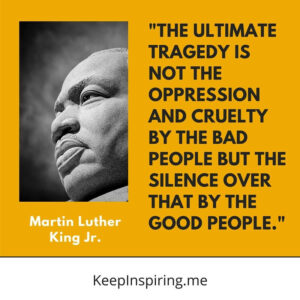
To keep up to date with our latest news, why not subscribe
Carol Stewart
Director
Chinara Enterprises Ltd
May 25 2021
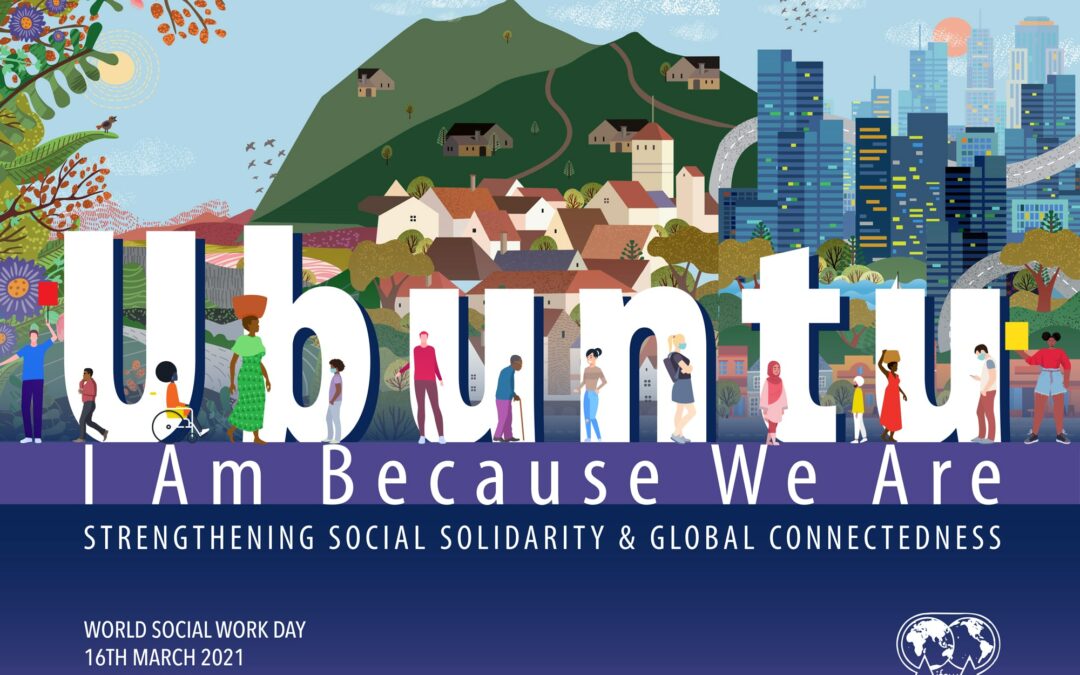
by Carol Stewart | Mar 16, 2021 | Community, Latest News
Happy World Social Work Day 2021 !
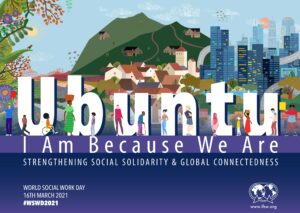
Tell us what you are doing to celebrate it, tweet us @chinara1 with the #worldsocialworkday with your message or image.
The theme this year is Ubuntu ” I am Because We are – Strengthening Social Solidarity and Global Connectedness ”
This theme resonates with me for so many reasons at this time, given the challenges we are facing with regards to the pandemic, our physical and mental well being, and the injustices we are seeing all over the world.
Over this past year, I have had many conversations since the murder of George Floyd, Breonna Taylor and in the past week the interview with the Duke and Duchess of Sussex with Oprah Winfrey about racism and institutional racism.
These conversations have sadly shown me that we still have a long way to go, I am seeing a worrying rise in the increase of right wing views expressed in full view of the world, in all forms of media, giving rise to an increase in online and offline hate crime and bullying.
I am seeing more people and organisations reflecting on their own values, and practice within their own organisation. I have also seen an increase in diversity in all forms of media, as a result of a sudden realisation of the importance of reflecting a more accurate portrayal of society. Maybe companies have realised that they are not reaching out to diverse audiences or maybe the worldwide reaction to the recent events have made them reflect.
I have been involved in either delivering or developing diversity training for over 30 years, and I often question the impact of diversity training, although years ago it was called race awareness, with more of a focus of learning about other cultures and what racism is, as opposed to encouraging participants to reflect on their own unconscious bias.
In the 1970’s s we saw the emergence of Black Identity theories such as Cross 1971, and in the 1990’s a rise in Black Identity training,in the wake of research into the impact of transracial adoption, a common practice in the 1960’s and 1970’s.
Fast forward 30 plus years, we now have Cultural Competency or Unconscious Bias training , which encourages us to reflect on our own values, and develop positive attitudes towards cultural differences, and gaining knowledge about different cultures to enable us to understand more about different cultures and their experiences, to help build better relationship. It also encourages us to reflect on any unconscious bias we may have towards others.
The variations of culture or diversity training all have the same aim, which is to enable people to understand the constructs of racism and discrimination, to encourage reflection on one’s values and perceptions, with the aim of hopefully one day achieving equality for all, an end to discrimination and racism as well as other forms of oppression.
So has it made a difference?
The Home Office published a report in 2018, which showed in the years 2017/18 there were over 94, 000 hate crimes recorded by Police in England and Wales, an increase of over 17% from the previous year. In 2019 that figure increased to over 97, 000 and in March 2020 there were over 105, 000 hate crimes reported.
As you can see that despite all legislation we have in place and all the training in place, we are seeing an increase year on year.
So what needs to change?
There needs to be personal as well as organisational shift. Its not enough just to have an equality and diversity policy, or mandatory equality and diversity training, that is merely a tick box exercise, when your organisation is not reflective of diversity at all levels, and your services do not meet the needs of diverse groups and staff are still experiencing inequality and discrimination.
Having celebrations in Black History month, or LGBT month and doing nothing the rest of the year, won’t have the same impact as having something that is integral in all of your celebrations and events, all year round.
When you go on training, do you reflect on what you need to do differently? Do you reflect on your own values and perceptions?
If we want to bring about any form of sustainable and long lasting change, we need to start with self. We need to value the diversity of other cultures, of people from different backgrounds, ages, genders, ability and disability, and show it in our actions.
Creating that domino effect, wherein you model the behaviour you want to see in others is one way in which we can bring about this change.
I would love to hear your own thoughts on the theme. Follow us on Twitter or on Facebook Chinara Enterprises and leave your views.
I also want to take the time to say a personal thank you to all social workers who have worked through one of the most challenging times during the past year, putting yourselves at risk to ensure that there is a service for all who need it during the pandemic.
We see a lot of claps for the NHS, who I know have found it equally if not more challenging during this time, and with very little reward.
Be proud of what you have achieved, I know I am proud of my contribution to social work, and feel very lucky to be doing something that I enjoy.
I shall be sharing my social work journey next week as part of our first free members event, as well as providing a guided tour of the new platform.
I hope to see you there !
CPD events
If you are in one of our members areas, you will benefit from discounted rates on all of our courses.
You can also access discounted rates for Making Research Count (MRC) events. A gentle reminder that you can only access the special rate for MRC events through this link, you will pay more if you book direct with MRC, so please do not email MRC to book.
Click on the latest events section of the website to see details of other events and to book your place.
To access the discounted rate, you will need to use your invitation code you were given when you received the information to join.
If you do not remember your invitation code, then please get in touch.
CPD hot topic !
We are really pleased to be launching an important seminar on the Liberty Protection Safeguards.
This is an essential briefing to gain an insight into the key legislative changes regarding mental capacity.
We have one of the leading lawyers Tim Spencer Lane, speaking at this seminar, with a Q and A.
Date: Tuesday 20th April 2021
Time: 6pm-7.30 pm
In July 2018, the government published a Mental Capacity (Amendment) Bill, which passed into law in May 2019. It replaces the Deprivation of Liberty Safeguards (DoLS) with a scheme known as the Liberty Protection Safeguards
This seminar will provide an overview of the following:
Background to the LPS – why they were introduced and key principles
What types of arrangements can be authorised and by whom?
The authorisation process
The key safeguards – including rights to advocacy and the Court of Protection
Other features of the LPS – including interim authorisations and the Mental Health Act interface
Next steps – the public consultation on the Code and regs, and transitional arrangements
Facilitator: Tim Spencer Lane
Tim is a lawyer who specialises in mental capacity, mental health, and social care law. He works for the Government Legal Department (Department of Health and Social Care) where he advises on mental capacity and mental health law.
At the Law Commission, Tim led the review of the Deprivation of Liberty Safeguards under the Mental Capacity Act 2005.
The fee is £20 + VAT for non members
£15 + VAT for members
Click here to book
To receive updates on our events and offers, please subscribe or checkout our membership offer







